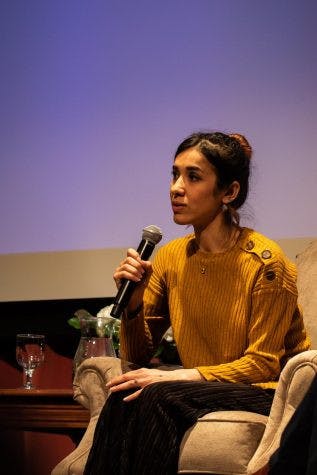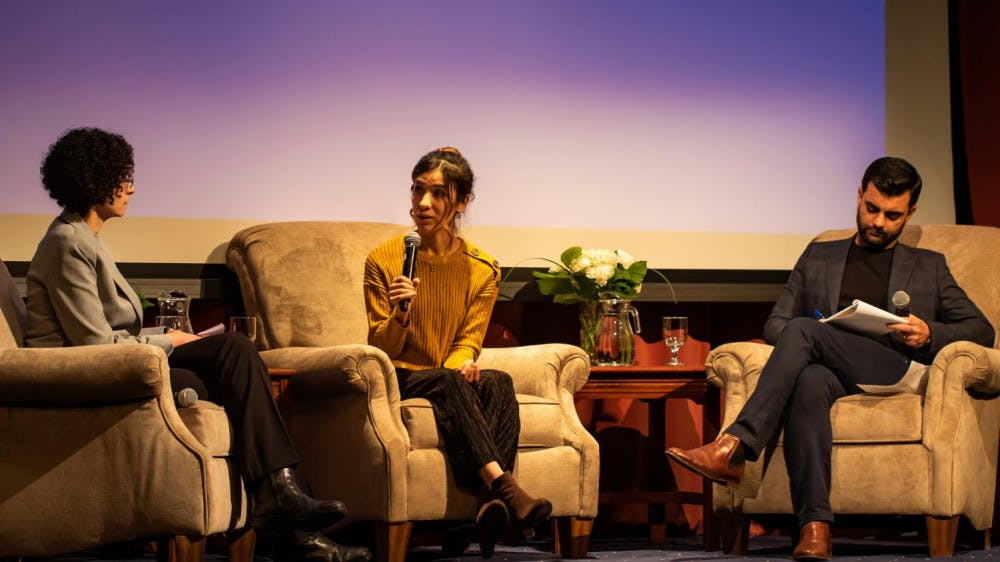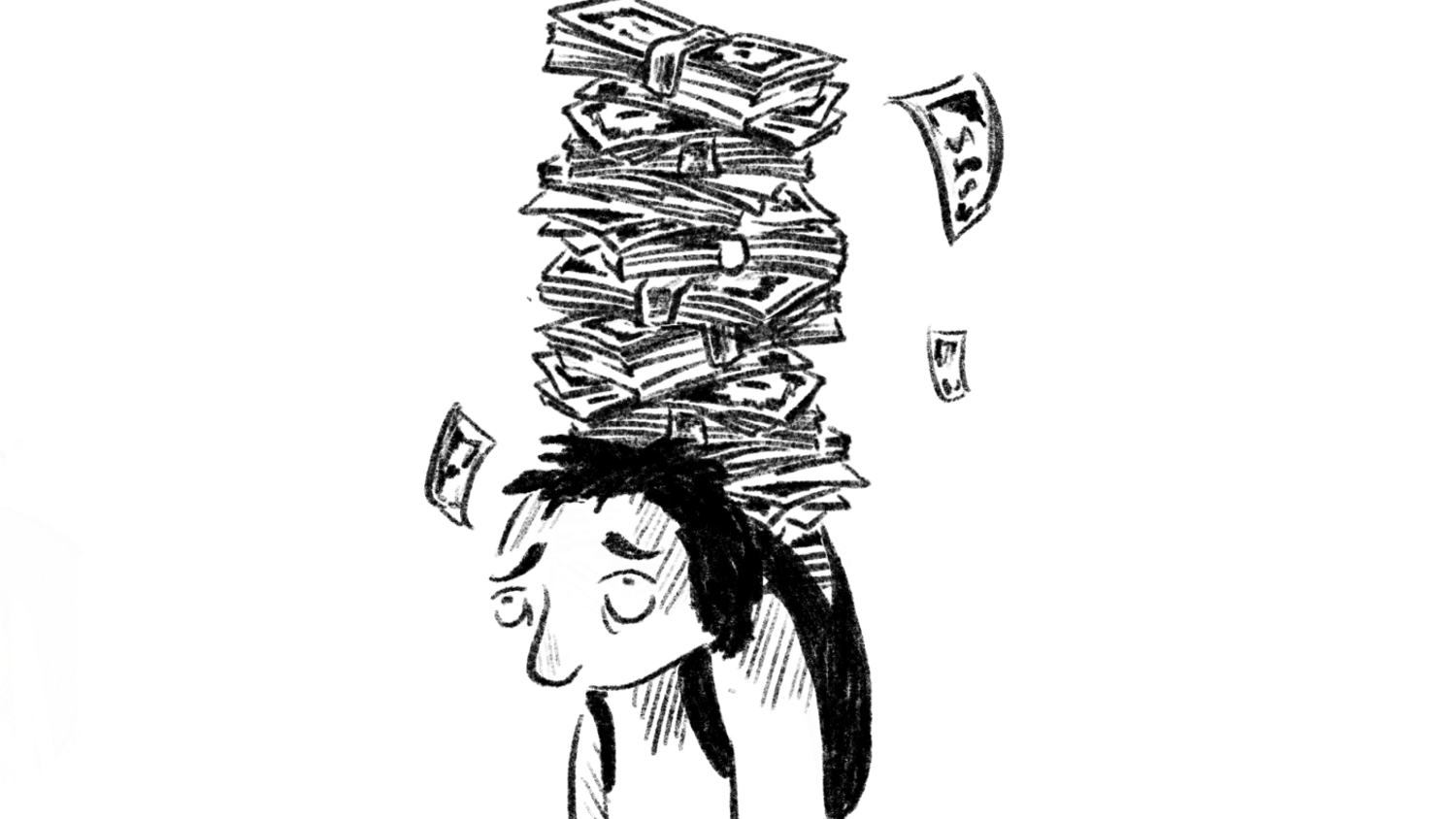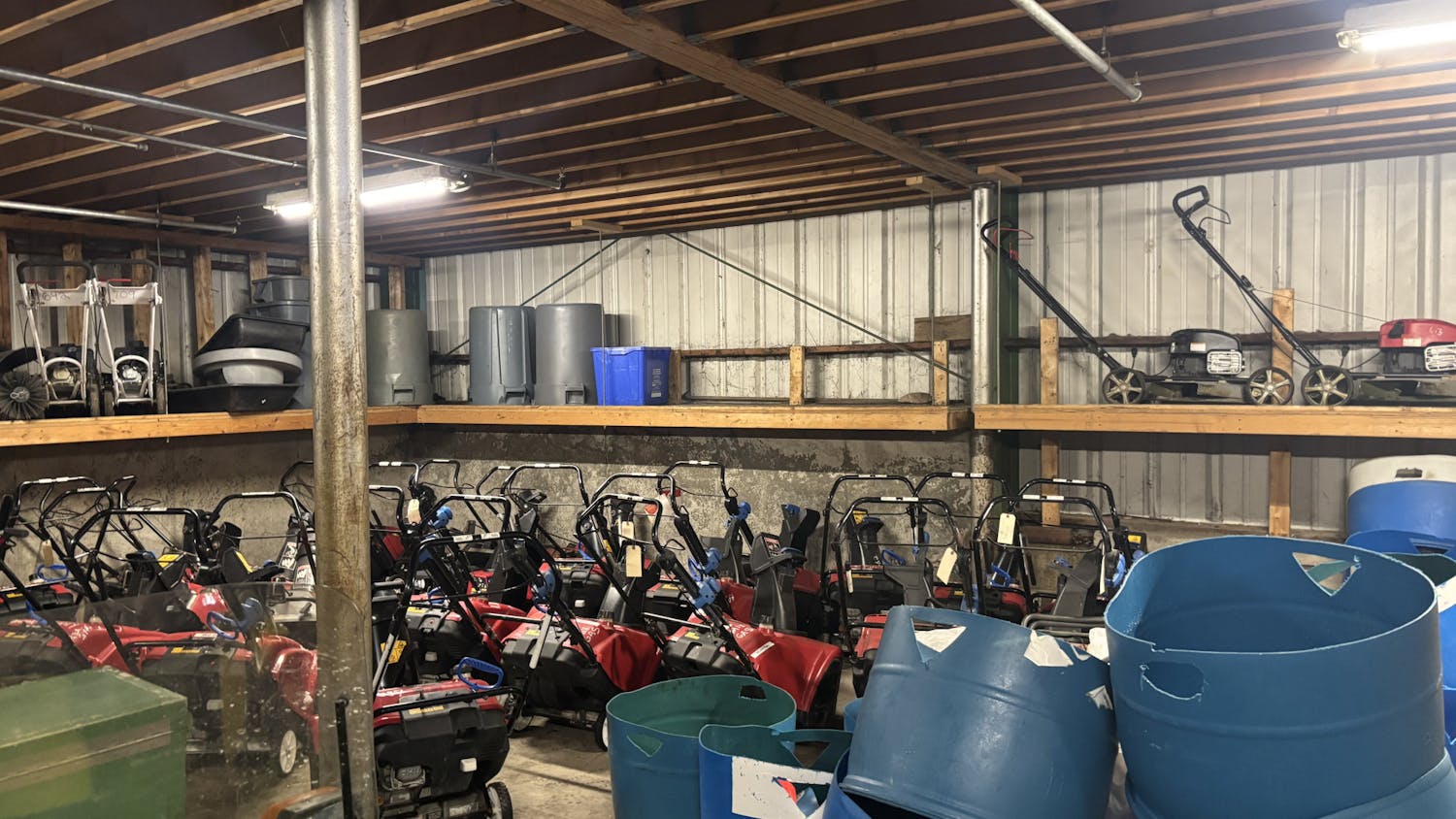When Nadia Murad was taken captive as a sex slave by ISIS in August 2014, she was 19 years old — the same age as many of the students who packed Wilson Hall to hear her speak on Tuesday night. Today, at age 26, Murad is using the atrocities she and her community faced to fuel a life of activism. Her talk, “Pursuing Peace and Justice: A Conversation with Nadia Murad,” explored her story as an activist and captive of ISIS and her recognition as a recipient of the Nobel Peace Prize, which she was awarded last fall. Murad became both the first Iraqi and Yazidi to receive the prize.
The talk Murad gave on Tuesday was originally scheduled for Oct. 5, but Murad had to cancel her visit last minute because she was awarded the Nobel Prize on that day. Murad and her co-winner Denis Mukwege received the prize “for their efforts to end the use of sexual violence as a weapon of war and armed conflict.”
Murad’s apology for the cancelation at the beginning of her talk on Tuesday was met with laughs from the audience.
The talk was introduced by Vice President for Academic Development and Professor of American Studies Tim Spears and facilitated by Associate Professor of History Febe Armanios. Murad was joined on stage by her fiancé and translator Abid Shamdeen.
Murad opened her talk by describing her background as a member of the Yazidi, a little-known ethno-religious minority group. The Yazidi only number around 500,000 to 700,000, and most of them live in Iraq. The region of Sinjar in northwestern Iraq is the Yazidis’ home, and Murad’s home village of Kocho is located in this region.
Kocho was home to around 1,700 people, and most families were dependent on farming and cattle. The youngest of 11 children, Murad was the only one of her siblings to attend school, as they could only afford for one child to go. “Our life was simple,” she said.
But by June of 2014, ISIS had begun to attack many villages around Sinjar. Members of other religious minorities, such as Christians, were given the option to stay in their homes and pay a fee or flee the territory. When ISIS entered Sinjar on Aug. 3, the Yazidi were not given such options.
“They had a specific plan of eradicating Yazidis from that region,” Murad said. “A specific plan of executing men mostly and enslaving women and children.”
The United Nations has classified ISIS atrocities against the Yazidis as acts of genocide. Six of Murad’s eight brothers were killed in the attack along with her mother and many nieces and nephews.
While much of the Sinjar region has been liberated from ISIS, political competition, reflecting regional conflicts, along with a lack of resources and reconstruction has made the Yazidi homeland difficult to return to, Murad said. Rather than return home, many Yazidi remain in refugee camps around the Middle East.
“It’s not a stable environment for Yazidis to go back to,” Murad said.
Today, over 3,000 Yazidi women and children remain in captivity in ISIS territory in Syria. Many are missing including Murad’s sister-in-law, who disappeared two years ago.
Many Yazidis are displaced, including about 350,000 who are living in camps in Northern Iraq along with more living in refugee camps in Greece and Turkey. About 65,000 Yazidi have returned home, Murad said, but those who did face daunting challenges, including poor health and lack of electricity.
While Yazidis have received some support from governments in Canada, Australia, France and Germany, Murad has called on regional governments, such as Turkey, for help.

Last year, Murad returned to Iraq and met with many local leaders. They discussed why the Yazidi people remained unprotected by the government even after the genocide and talked about ways in which the government could help support the Yazidis so they can start rebuilding Sinjar. Murad also helped obtain approval from the Iraqi government to build a genocide museum in Sinjar.
During her visit, Murad returned to Kocho, where she attended a religious celebration meant to honor the dead. This was the first time they celebrated the holiday since the genocide.
“I wanted to do this as a restart of our culture and traditions and to help people start doing the same thing we used to do,” she said.
In 2016, Murad founded Nadia’s Initiative, a nonprofit organization working to address issues of sexual violence, advocate for victims and aid communities affected by crisis. In the talk, Murad discussed the difficulties of using her personal tragedies to construct a life of activism.
“For me as a woman, as a survivor, someone who has lost family members and been through this trauma it was especially difficult for a woman from the Middle East, from that region, to break taboos and speak about these stories,” she said. “But I had no other choice but to do it.”
Murad explained how she hopes that the Nobel Peace Prize will help further her goals.
“We are hoping to use this recognition to put more light on these communities that are facing persecution and genocide and prevent these acts to take place in the future,” she said, stressing the importance of recognizing the genocide in real terms to ensure against the extinction of the Yazidi community.
Murad recognized the possibility that the Yazidis will leave their ancestral homeland in order to seek better and safer lives somewhere else. But, even when Yazidis have made it to different places in Europe, she said, many still face discrimination. Their homes are raided by police looking to deport them, and many have been denied asylum.
She described what is has been like to live away from her home for the past few years. In addition to drastic cultural and day to day differences, she discussed the sad truth that her perpetrators were able to stay in her homeland while she had to flee.
Murad finished her talk with a message for young people, and Middlebury students in particular.
“You as students here are lucky to have the chance to come here and study and choose your own path,” she said, emphasizing that not all young people have these opportunities.
Murad also highlighted that governments and weapons can’t solve all these problems and that she counts on young people to accomplish her goals.
Following the talk Nora Peachin ’21 reflected on the importance of having Murad speak at Middlebury.
“The takeaway for me is there really is no excuse not to be doing activism work and speaking out and fighting for justice and peace,” Peachin said.
Nobel Winner Murad Sheds Light on Yazidi Genocide in Talk

MICHAEL BORENSTEIN
Comments



